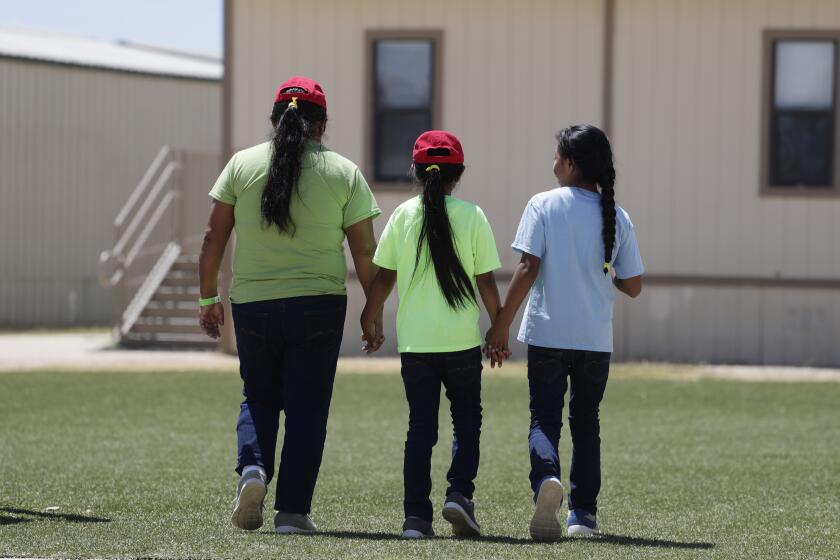Judge Orders Release of Cuban Held 7 Years Without Being Convicted
- Share via
A federal judge in Los Angeles has ruled that the indefinite detention of a Mariel Cuban in federal prison is unconstitutional and has conditionally ordered the man’s release into a supervised program, court records showed Thursday.
Legal experts say Judge David V. Kenyon’s decision to grant a writ of habeas corpus to Alexis Barrera-Echavarria could establish a precedent for many of the estimated 1,500 other Mariel detainees being held in federal prisons around the country.
Barrera-Echavarria has a record: Since coming to the United States in 1980, he has been arrested on suspicion of grand theft auto, retail theft and burglary and has served time for armed robbery. He also was accused in a forcible sodomy case in which charges were dropped.
But Barrera-Echavarria has served his sentences and is not awaiting trial on other charges. And--as in the case of other Mariel detainees, most of whom have criminal records--the Cuban government has refused to accept Barrera-Echavarria’s return and the United States has been unable to deport him to a third country.
“I can find no statutory basis for the government’s contention that the attorney general has discretion to detain indefinitely an excludable alien who has never been convicted of an aggravated felony and whose prospects for being deported are marginal at best,” Kenyon wrote in his Oct. 7 decision in the Central District Court here.
“More importantly, I believe that the United States’ continued incarceration of Mr. Barrera, after he has served over seven years in a federal prison, without ever having been convicted of a federal offense, constitutes punishment and thus violates the 5th and 6th Amendments.”
Kenyon ordered that Barrera-Echavarria be released “into a halfway house or some other form of supervised released program” within 60 days, “unless the attorney general can show that his deportation is imminent.”
Barrera-Echavarria remains in a federal prison in Nevada while government attorneys prepare their response to the order. Assistant U.S. Atty. Michael Johnson noted that the United States recently has been talking to Cuba about possible repatriation of some of the detainees, “and we are looking at (Kenyon’s) decision in light of these discussions.”
Barrera-Echavarria was among the first of the 125,000 refugees who began arriving in Florida in 1980 from the Cuban fishing port of Mariel. Some of the “Marielitos” were prison inmates released by Cuba. Barrera-Echavarria had been freed from a Cuban prison, where he was awaiting trial on a pickpocketing charge.
The U.S. government placed Barrera-Echavarria on immigration parole, but within months he was arrested on a variety of criminal charges. In March, 1983, he pleaded guilty to two counts of armed robbery with a firearm and served two years in a Florida state prison.
On the day of his release, his immigration parole was revoked. An immigration judge found him “excludable” and ordered his deportation. Because Cuba would not take him back, Barrera-Echavarria was placed in a federal prison.
More than six years later, in January, 1992, he was put back on immigration parole and transferred to a halfway house in Pomona. While there, he was arrested on suspicion of sexually assaulting another resident of the house while threatening the man with a knife.
The arrest led to revocation of Barrera-Echavarria’s parole, and he returned to federal prison on June 24, 1992.
The sodomy charges were dropped because the alleged victim was found mentally incompetent to testify and on Aug. 21, 1992, Barrera-Echavarria asked Judge Kenyon to order his release. Kenyon ruled that the government had not abused its discretion in revoking Barrera-Echavarria’s parole, but Kenyon noted that the Cuban’s continued detention “raised serious legal questions.”
Last spring, assisted by attorneys Mark Kemple and Karen Fredericksen, Barrera-Echavarria filed another request for release. Kenyon agreed and issued the release order.
Charles Weisselberg, a USC law professor, said other detainees in the Second District may use Kenyon’s arguments in filing petitions for release.
“It’s one of the very few cases in which a judge has looked at the government’s overall policy in such cases,” Weisselberg said Thursday. “If the decision convinces other judges to follow, it could lead to the release of many other Mariel Cubans.
“Up to now, the courts have been really hostile to most of these cases,” Weisselberg said. “This is the first real victory (for the Mariel Cubans) in many years.”
More to Read
Sign up for Essential California
The most important California stories and recommendations in your inbox every morning.
You may occasionally receive promotional content from the Los Angeles Times.










